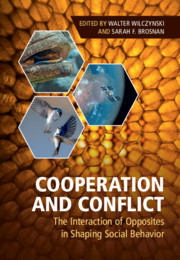Book contents
- Cooperation and Conflict
- Cooperation and Conflict
- Copyright page
- Dedication
- Contents
- Contributors
- Acknowledgments
- Introduction
- Part I Broad Insights from Political Science to Molecular Behavior
- Part II Neural Mechanisms
- 5 Social Living and Rethinking the Concept of “Prosociality”
- 6 The Role of the Temporal Lobe in Human Social Cognition
- 7 Role of Oxytocin and Vasopressin V1a Receptor Variation on Personality, Social Behavior, Social Cognition, and the Brain in Nonhuman Primates, with a Specific Emphasis on Chimpanzees
- Interim Summary
- Part III Species Comparisons
- Index
Interim Summary
from Part II - Neural Mechanisms
Published online by Cambridge University Press: 08 February 2021
- Cooperation and Conflict
- Cooperation and Conflict
- Copyright page
- Dedication
- Contents
- Contributors
- Acknowledgments
- Introduction
- Part I Broad Insights from Political Science to Molecular Behavior
- Part II Neural Mechanisms
- 5 Social Living and Rethinking the Concept of “Prosociality”
- 6 The Role of the Temporal Lobe in Human Social Cognition
- 7 Role of Oxytocin and Vasopressin V1a Receptor Variation on Personality, Social Behavior, Social Cognition, and the Brain in Nonhuman Primates, with a Specific Emphasis on Chimpanzees
- Interim Summary
- Part III Species Comparisons
- Index
Summary
One of the foundational approaches to the evolution of behavior is the comparative approach. The underlying logic is to use similarities and differences across species to draw conclusions about the evolution of the trait in question, with the assumption that similar selective pressures lead to similar traits. When using this approach to understand humans, a natural starting place is the other primates, as we are primates ourselves. But this is not the only approach; we may also wish to know what the impact of a specific feature is, in which case we will focus on other species that have the same feature independent of phylogeny, or share a particular ecological or social niche. Convergences across disparate taxa may suggest the ways in which the trait in question is linked to a specific behavioral outcome.
- Type
- Chapter
- Information
- Cooperation and ConflictThe Interaction of Opposites in Shaping Social Behavior, pp. 161 - 164Publisher: Cambridge University PressPrint publication year: 2021



